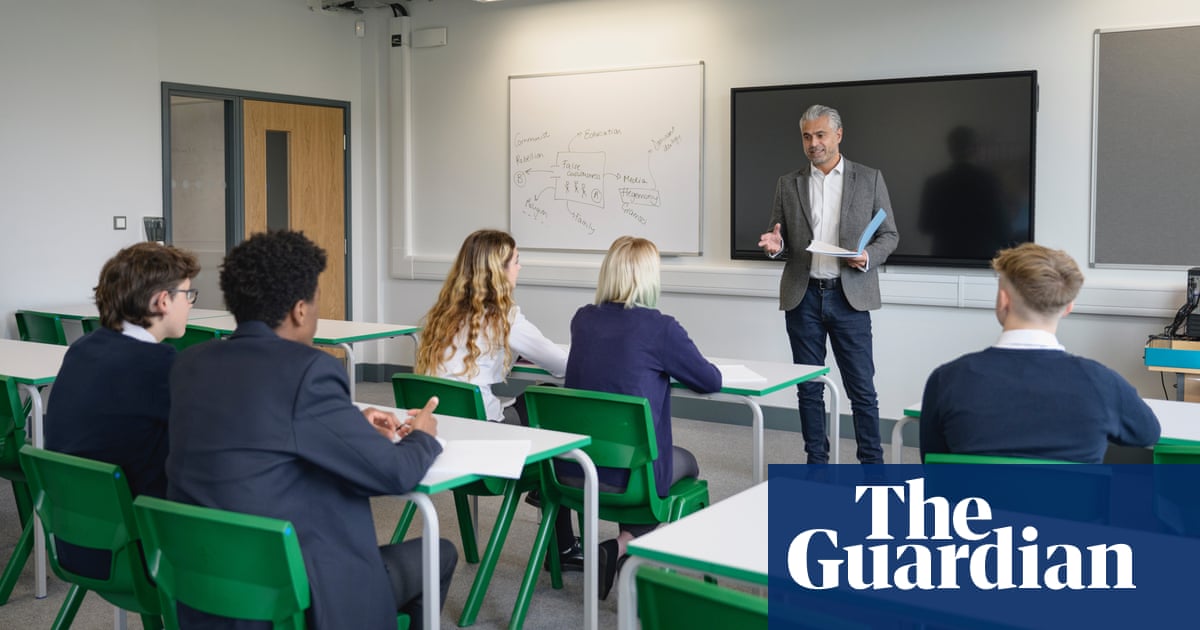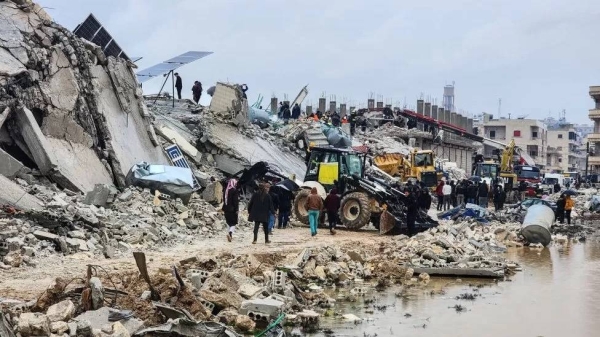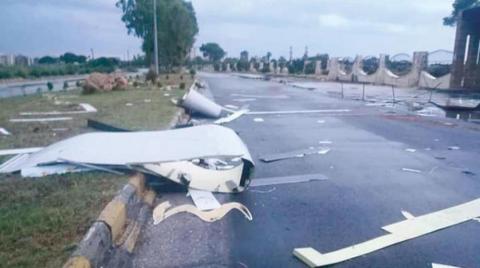
Letters for Hope was launched to counter the Assad regime narrative that the world has abandoned the Syrian people
Children have suffered the brunt of the war, with UN monitors saying the regime targets civilians indiscriminately
WASHINGTON, D.C.: “Have hope, stay strong, you are loved somewhere.” These are the words of American schoolchildren, handwritten on colorful paper and posted thousands of miles away to boys and girls in Syria’s besieged rebel-held areas.
Hope may seem in short supply in Syria, but thanks to a group of dedicated activists in the US and their humanitarian colleagues in Syria itself, a measure of relief and messages of solidarity are on hand.
The Syrian Emergency Task Force, a US-based NGO founded in 2011, connects America’s heartland with communities in Syria, while also providing vital humanitarian assistance to the country’s vulnerable children.
“Letters of Hope” was launched in 2016 to counter the claims of Syrian President Bashar Assad’s regime and its international backers that the international community has abandoned the Syrian people.
A boy holds a personal photo print showing children as he stands by rubble in the aftermath of Syrian government forces" bombardment on the town of Balashun in the Jabal al-Zawiya region in the south of Syria"s rebel-held northwestern Idlib. (AFP)
The program collects letters of solidarity from young people around the world and sends them directly to displaced Syrian civilians to reassure them they are not alone.
“To take part in the letters of hope mission is more than just a sign of solidarity. It is a movement,” Abby Straessle, SETF’s director of development, told Arab News.
Many of the Syrian children who receive these letters live under regime bombardment. Attacks have recently intensified in Syria’s northwest, already shattered by a Russian and Iranian-backed offensive in March last year.
Children have suffered the brunt of the conflict, which began more than a decade ago when anti-government protests were brutally repressed, sparking a bloody civil war.
One recent batch of hand-decorated cards came from Holy Souls’ pre-kindergarten class in Little Rock, Arkansas in the US. (AN Photo)
The Syrian Civil Defense, a non-governmental organization popularly known as the “White Helmets,” alleges that regime artillery and Russian jets have deliberately targeted schools and deprived children of an education. The Russian government strenuously denied responsibility for such airstrikes.
A recent report from the UN Independent International Commission of Inquiry on the Syrian Arab Republic claims that residential areas, markets, and medical facilities have also been deliberately targeted, often indiscriminately.
Syrian children are frequently killed in such attacks on civilian infrastructure. In July, Russian-made Kransnopol guided artillery shells struck a medical facility in the southern countryside of Idlib, killing six children.
According to UNICEF, some 512 children were killed in similar attacks last year, most of them in northwest Syria. Around 1.7 million vulnerable children reside in the rebel-held areas, most of whom have been displaced multiple times by successive regime offensives.
Psychological warfare appears to figure prominently in the regime’s tactical playbook. Leaflets are regularly dropped from the air over rebel-held areas warning residents they “face annihilation” if they do not leave.
A man carries a girl who was injured during aerial bombardment at a make-shift camp for displaced Syrians, along a stairway in a hospital in the atby town of Maaret Misrin in the north of Syria"s rebel-held Idlib province. (AFP)
“Everyone has given up on you,” one such leaflet read, referring to the international community. “They left you alone to face your doom.”
Letters of Hope began as a direct challenge to that message, reminding Syrian children they have not been forgotten.
“Letters of Hope shows the people of Syria that even if world governments look away and even if the US administration continues to distance itself from the atrocities unfolding in Syria, the American people and people all over the world stand in solidarity with civilians demanding freedom in war-torn Syria,” Mouaz Moustafa, director of SETF, told Arab News.
Of course, letters alone cannot provide Syrian children with an education, protect them from bombardment, nor ease the pangs of hunger. That is why SETF has a parallel program in northern Syria called Wisdom House, which runs a kindergarten, and a women’s center called Tomorrow’s Dawn.
The center has provided hundreds of women with vocational training, offering professional certificates in cosmetology, nursing, crafts, and computer science.
INNUMBERS
* 13.4 million Syrians in need of humanitarian assistance, the highest since 2017.
* $4.2 billion Syrian Humanitarian Response Plan, which is only 27% funded.
(Source: UN)
“Your beautiful and emotional words enter our hearts and give us hope,” Moumena, an English teacher and principal of Wisdom House, said in response to the letters.
“It means so much for me personally and for the other teachers who take care of the children. When we see the letters that are sent by teachers and students and people who care about us, we feel that we will be safe and there are no doubts that we will be the winners.
“They give us strength, hope, and love. Everyone who sends us these letters has a beautiful, sweet and faithful heart. Again and again, I say thank you from the bottom of our hearts to anyone who stands with us and sends us these beautiful words.
“The first letter I received said: ‘Be strong, you are not alone.’ These words were and still mean so much to me,” she told Arab News.
To date, more than 2,000 letters from 17 US states have been delivered to schoolchildren in Syria. The letters are collected by SETF volunteers and then taken over the Turkish border into rebel-held Syria.
For so many around the world, the Syrian conflict and those caught up in the fighting and repression feel very far away. The personal touch these letters carry created a direct link between children born in entirely different circumstances. (AN Photo)
One recent batch of hand-decorated cards came from Holy Souls’ pre-kindergarten class in Little Rock, Ark. Wisdom House responded with a photograph of its classrooms decorated with the letters and its pupils proudly holding up a banner that read: “Arkansas stands with the People of Syria.”
It was a simple yet powerful reminder that Syria’s children are not alone.
For so many around the world, the Syrian conflict and those caught up in the fighting and repression feel very far away. The personal touch these letters carry created a direct link between children born in entirely different circumstances.
“The schools endured several forced displacements over the years, and the community was permanently forced from their homes in Idlib in early 2020,” Natalie Larrison, director of Wisdom House, told Arab News.
“Despite these obstacles, the resilience of the teachers and their communities, along with the incredible dedication of Wisdom House supporters, have kept both the kindergarten and women’s center successful and thriving.
“We hope that the children’s smiles are enough for our world leaders to see the importance of keeping them safe and giving them a chance for a free and happy future.”
A girl who was injured during aerial bombardment at a make-shift camp for displaced Syrians, is treated in the emergency ward of a hospital in the atby town of Maaret Misrin in the north of Syria"s rebel-held Idlib province on September 7, 2021. (AFP)
The fighting and human-rights violations in Syria no longer make headline news around the world. Analysts say this indifference, coupled with the inaction of the UN Security Council, has emboldened the regime to continue its bombing campaign.
Earlier this month, Russian President Vladimir Putin welcomed Assad to the Black Sea resort of Sochi. The Kremlin hopes to convince the world to welcome the Syrian president back into the international fold and recognize him as Syria’s rightful ruler, despite his documented record of war crimes.
The Russian government has also been pressing European nations to declare Syria “safe” for refugees to return to areas under regime control.
The experience of Syrians driven out by the war tells a different story. Omar Al-Shogre, a Swedish public speaker and human rights activist who has worked closely with the Syrian emergency task force, spent years inside one of the regime’s most notorious prisons.
“There is something that the Syrian people fear far more than dying under bombardment. It is being detained by the intelligence services,” he told Arab News.
The program collects letters of solidarity from young people around the world and sends them directly to displaced Syrian civilians to reassure them they are not alone. (AN Photos)
“That basically means going through physical, sexual, and psychological torture for as long as you manage to stay alive in that detention center. Syrians refuse to return to Syria because someone is waiting for them. That someone is the intelligence services.”
For the children of rebel-held Syria, only the continuous lobbying of groups like SETF can prevent them from being forgotten altogether.
“Our vision for the future is to continue providing quality education to even more Syrians until every child has a chance to go to a school like Wisdom House,” Larrison said.
“Although the future of Syria is uncertain, we hope that the world will realize the importance of protecting these beautiful children and communities in Syria by telling their stories.”












